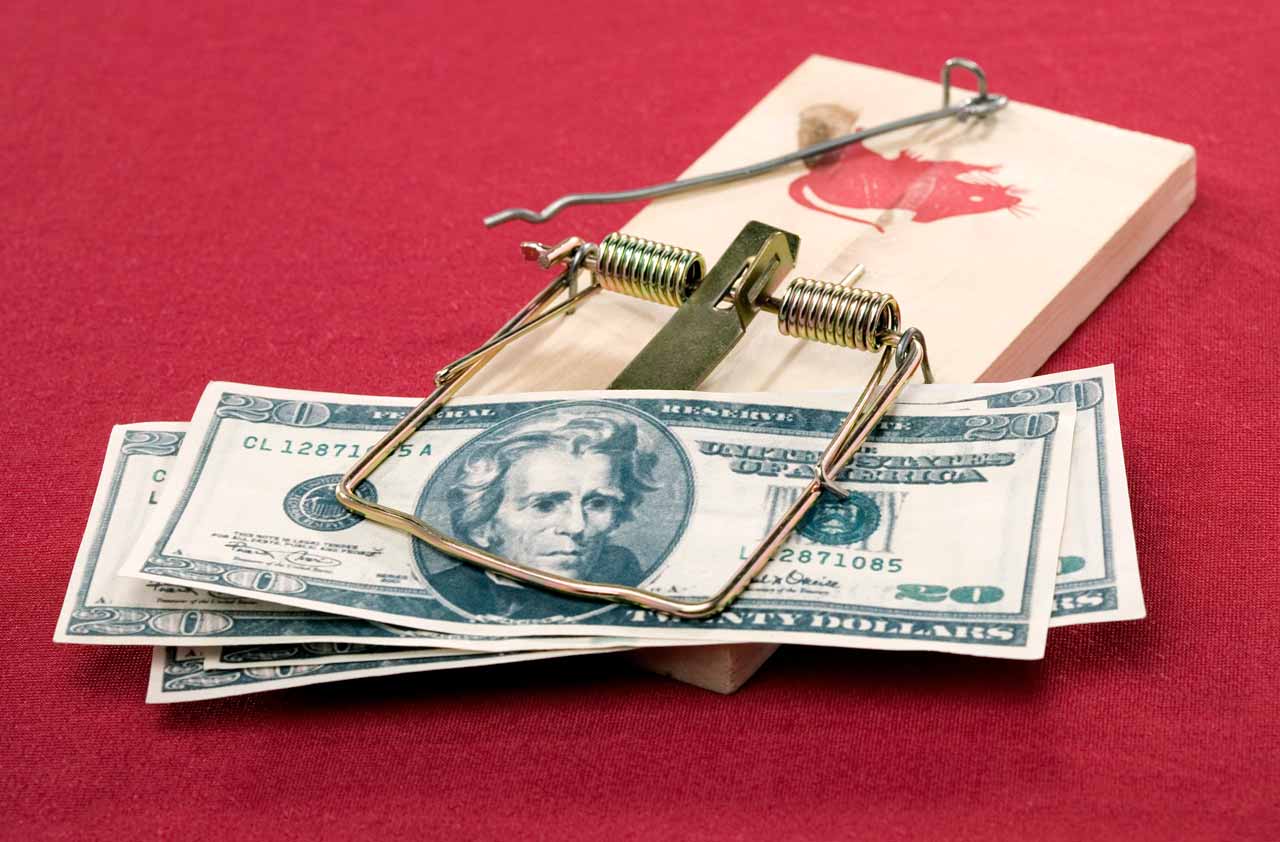5 Ways Your 401(k) Is a Tax Trap (and What to Do about It)
That massive 401(k) nest egg that you're so proud of comes with some serious baggage. Here are five major cons of these accounts and a couple of alternatives to consider instead.


Profit and prosper with the best of Kiplinger's advice on investing, taxes, retirement, personal finance and much more. Delivered daily. Enter your email in the box and click Sign Me Up.
You are now subscribed
Your newsletter sign-up was successful
Want to add more newsletters?

Delivered daily
Kiplinger Today
Profit and prosper with the best of Kiplinger's advice on investing, taxes, retirement, personal finance and much more delivered daily. Smart money moves start here.

Sent five days a week
Kiplinger A Step Ahead
Get practical help to make better financial decisions in your everyday life, from spending to savings on top deals.

Delivered daily
Kiplinger Closing Bell
Get today's biggest financial and investing headlines delivered to your inbox every day the U.S. stock market is open.

Sent twice a week
Kiplinger Adviser Intel
Financial pros across the country share best practices and fresh tactics to preserve and grow your wealth.

Delivered weekly
Kiplinger Tax Tips
Trim your federal and state tax bills with practical tax-planning and tax-cutting strategies.

Sent twice a week
Kiplinger Retirement Tips
Your twice-a-week guide to planning and enjoying a financially secure and richly rewarding retirement

Sent bimonthly.
Kiplinger Adviser Angle
Insights for advisers, wealth managers and other financial professionals.

Sent twice a week
Kiplinger Investing Weekly
Your twice-a-week roundup of promising stocks, funds, companies and industries you should consider, ones you should avoid, and why.

Sent weekly for six weeks
Kiplinger Invest for Retirement
Your step-by-step six-part series on how to invest for retirement, from devising a successful strategy to exactly which investments to choose.
Just about every financial expert I know advises savers to contribute to their company’s 401(k) plan — at least enough to receive the employer’s matching contribution.
I can’t argue any differently.
That company match is free money — a bonus from the boss — so why not cash in if you can?
And, of course, the tax breaks are another bonus. Because the money comes out of your paycheck before taxes are calculated and compounds every year without a bill from Uncle Sam, investing in a defined contribution plan is bound to make April 15 more tolerable.
Not a bad deal, right?
Until you’re ready to retire, that is. That’s when a 401(k) (or 403(b) or traditional IRA) suddenly becomes the worst possible retirement plan, from a tax perspective, a saver could have. Here’s why:
Written by Michael Reese, CFP®, the founder and principal of Centennial Advisors LLC, which has offices in Austin, Texas, and Traverse City, Mich. Michael's vision is to help American retirees "re-think" how they manage their financial portfolios during their retirement years.

1. Every distribution you take will be taxed at your highest rate
When you eventually make withdrawals from a traditional defined contribution plan, you'll have to pay regular income taxes on that amount each year, whether the money came from your contributions, dividends or capital gains. And the money will be taxed at your income tax rate at the time you withdraw it — whatever that may be. (The top marginal income tax rate for 2020 is 37%, but it's likely to change down the road.)
You’ve likely been told you’ll be in a lower tax bracket in retirement, but that isn’t necessarily true. If you keep the same standard of living, you will require about the same amount of income, which means the same tax rate. And in retirement, when your children are grown, your house is paid for and those substantial tax deductions have gone away, you may end up in a higher bracket.

2. Double taxation is often the ‘norm’
Besides paying income taxes on the money coming out of your retirement plan, depending on how much you withdraw each year, you also could end up paying more taxes on your Social Security benefits.
If you are like many retirees, you may not realize that distributions from your retirement plans (with the exception of a Roth IRA) count against you when you calculate how much of your Social Security is subject to tax. So you pay tax on your retirement plan distribution, and then you pay tax again on more of your Social Security income. And, don’t forget, if you have capital gains, dividends and interest from investments, you may end up paying more taxes on those as well.

3. Ready or not, you have to withdraw money when the IRS says so
Your traditional defined contribution plan is pretty much the only type of retirement account that requires you to withdraw money even if you don’t want to. The IRS won’t allow you to keep retirement funds in your account indefinitely, however thanks to the recent passage of the SECURE Act, you have a little more time before those required minimum distributions must begin. You generally have to start taking withdrawals when you reach age 72 (previously the age was 70½, and it still is for anyone born before July 1, 1949). If you don’t, or if you make a mistake in calculating your required minimum distributions (RMDs), you may have to pay an additional 50% tax.

4. It’s absolutely the worst account to leave to a surviving spouse
If you want your spouse to be financially secure and your solution is to leave behind a big IRA or 401(k), think again. You’re leaving behind a fully taxable account to someone who is about to go from the lowest-obligation tax status (married filing jointly) to the highest-obligation tax status (single). It’s the opposite of what you should do.

5. Your account is fully exposed to tax law changes
You have a silent partner in your 401(k), and his name is Uncle Sam. Every time Congress meets, there’s a chance the government could decide to increase the IRS’ share of your savings — and quite frankly, you have nothing to say about it. If you don’t think that’s a problem — if you don’t expect tax rates to increase in the future — check out www.usdebtclock.org.

Strategies to Unwind Your 401(k) Tax Troubles
So, what should you do if you’re somewhere between Point A (when saving money in a 401(k) plan seems like a great idea) and Point B (when withdrawing money from a 401(k) seems like a very bad idea)?
You should sit down with your tax planner (not your tax preparer) every year to identify strategic ways to exit out of these accounts. What’s the difference between a tax planner and a tax preparer? Well, a tax planner educates you on ways to reduce your taxes now and in the future, while a tax preparer just calculates your tax bill and sends it off to the IRS.
You may want to move that money from a traditional IRA to a Roth IRA through Roth conversions — realizing that you’d have to pay the tax bill on the amount you’re converting. Or you could move it into a specially designed life insurance plan that works very similarly to a Roth. (Don’t mess with the life insurance option unless you’re working with someone who truly understands that environment, though.)
You’ll pay a little extra in taxes today, but you’ll eliminate every problem I’ve talked about here:
- One: Any future distributions from those accounts will be tax free instead of taxable.
- Two: They won’t count against your Social Security or capital gains tax calculations the way they do when you’re in a traditional IRA.
- Three: You won’t have forced distributions from either of those options.
- Four: You’ll have tax-free money to leave behind for a surviving spouse.
- Five: And you should be immunized against any actions Congress might take to increase the government’s share of your savings.

Final Thoughts
Here’s the thing to think about with all your accounts: You can pay taxes now or you can pay taxes later, but taxes will be paid. So, talk to your financial adviser and/or tax professional about what that looks like for you and your family. And be prepared to make some moves as you transition toward retirement.
Kim Franke-Folstad contributed to this article.
Profit and prosper with the best of Kiplinger's advice on investing, taxes, retirement, personal finance and much more. Delivered daily. Enter your email in the box and click Sign Me Up.

Michael Reese is the founder and CEO of Centennial Advisors, LLC. He is the host of the television show Retiring Well and the author of two books: Retiring Well: How to Enjoy Retirement in Any Economy and The Big Retirement Lie: Why Traditional Retirement Planning Benefits the IRS More Than You. He has been featured in major publications such as Kiplinger, U.S. News & World Report and Yahoo Finance. Reese also is a featured speaker at industry events.
-
 Quiz: Do You Know How to Avoid the "Medigap Trap?"
Quiz: Do You Know How to Avoid the "Medigap Trap?"Quiz Test your basic knowledge of the "Medigap Trap" in our quick quiz.
-
 5 Top Tax-Efficient Mutual Funds for Smarter Investing
5 Top Tax-Efficient Mutual Funds for Smarter InvestingMutual funds are many things, but "tax-friendly" usually isn't one of them. These are the exceptions.
-
 AI Sparks Existential Crisis for Software Stocks
AI Sparks Existential Crisis for Software StocksThe Kiplinger Letter Fears that SaaS subscription software could be rendered obsolete by artificial intelligence make investors jittery.
-
 States That Tax Social Security Benefits in 2026
States That Tax Social Security Benefits in 2026Retirement Tax Not all retirees who live in states that tax Social Security benefits have to pay state income taxes. Will your benefits be taxed?
-
 What to Do With Your Tax Refund: 6 Ways to Bring Growth
What to Do With Your Tax Refund: 6 Ways to Bring GrowthUse your 2024 tax refund to boost short-term or long-term financial goals by putting it in one of these six places.
-
 What Does Medicare Not Cover? Eight Things You Should Know
What Does Medicare Not Cover? Eight Things You Should KnowMedicare Part A and Part B leave gaps in your healthcare coverage. But Medicare Advantage has problems, too.
-
 12 Great Places to Retire in the Midwest
12 Great Places to Retire in the MidwestPlaces to live Here are our retirement picks in the 12 midwestern states.
-
 15 Cheapest Small Towns to Live In
15 Cheapest Small Towns to Live InThe cheapest small towns might not be for everyone, but their charms can make them the best places to live for plenty of folks.
-
 15 Reasons You'll Regret an RV in Retirement
15 Reasons You'll Regret an RV in RetirementMaking Your Money Last Here's why you might regret an RV in retirement. RV-savvy retirees talk about the downsides of spending retirement in a motorhome, travel trailer, fifth wheel, or other recreational vehicle.
-
 The 24 Cheapest Places To Retire in the US
The 24 Cheapest Places To Retire in the USWhen you're trying to balance a fixed income with an enjoyable retirement, the cost of living is a crucial factor to consider. Is your city the best?
-
 The Six Best Places to Retire in New England
The Six Best Places to Retire in New Englandplaces to live Thinking about a move to New England for retirement? Here are the best places to land for quality of life, affordability and other criteria.
